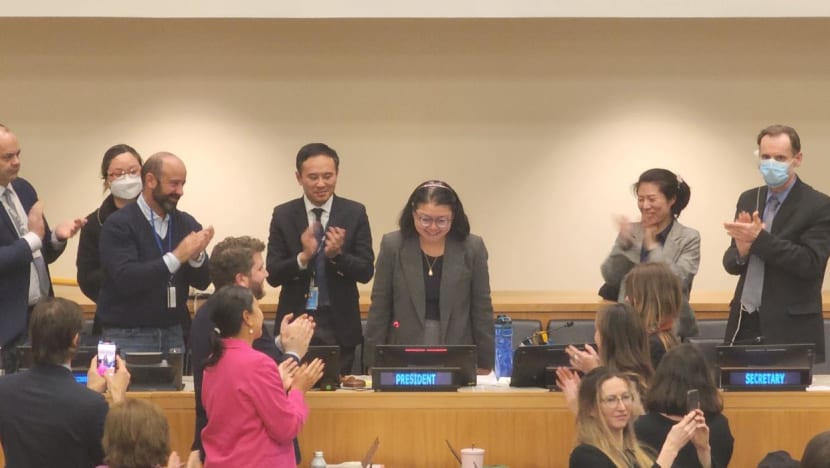Singapore’s oceans ambassador calls for urgent action following UN high seas treaty success
“The draft agreement is not perfect but it is a solid foundation that gives us the tools we need to address the urgent threats that are facing our oceans,” said Ms Rena Lee.

The Intergovernmental Conference (IGC) on Biodiversity Beyond National Jurisdiction (BBNJ) congratulating its President, Ambassador Rena Lee, on the successful conclusion of the BBNJ treaty. (Photo: Ministry of Foreign Affairs, Singapore)
BANGKOK: Singapore’s oceans issues ambassador Rena Lee has called on nations to sign and ratify a global agreement to protect the high seas as soon as possible, following a breakthrough in decades-long negotiations earlier this month.
Mrs Lee, the president of the negotiations at the Intergovernmental Conference on Marine Biodiversity of Areas Beyond National Jurisdiction - or BBNJ, oversaw talks among more than 190 countries that agreed to the historic United Nations High Seas Treaty on Mar 4.
The treaty would allow the establishment of marine protected areas (MPAs) and other conservation efforts on the high seas, ocean areas that exist outside national borders and have previously never had a legal mechanism to cover them.
This equates to about two-thirds of all the oceans in the world, where human exploitation, including overfishing, illegal fishing and seabed mining, as well as climate change, poses enormous threats to critical ecosystems.
With the text for the treaty now complete, a potentially lengthy period lies ahead as individual states need to ratify the agreement. This could take several years.
Mrs Lee, who is Singapore’s Ambassador for Oceans and Law of the Sea Issues, urged all stakeholders, including governments and the public and private sector to take stronger and more decisive action to curb the damage occurring on the high seas.
In a written interview, she said: “We cannot just rely on the agreement alone. Action can and should start right now.”
“For years, our oceans have faced unprecedented threats. The waters and their marine biodiversity move freely across borders. The failure to protect the high seas will have far-reaching ramifications on global marine ecosystems as a whole, including waters closer to our shores.
“The BBNJ Agreement does not contain specific targets, nor is it a one-size-fits-all panacea for all the ills that face our oceans. Rather, the agreement provides the means to tackle these ills by putting in place the necessary mechanisms and processes, and I hope that many countries will sign and ratify the agreement as soon as possible,” she said.
“There was a determination among delegations that it was high time to conclude this treaty for the high seas.”
She also told CNA: “As I had mentioned in my statement at the closing plenary session – there will be no re-opening or discussion on substance of the text going forward. In my opinion, this is significant and bodes well for the agreement’s prospects in terms of its early adoption and widespread ratification by UN Member States.”
The treaty needs to be formally adopted at a later UN session and then ratified by at least 60 parties before it becomes effective.
A conference of the parties - or COP - will be set up so that country representatives can meet on a regular basis and hold each other accountable to the agreement.
Mrs Lee, who is also a Special Envoy of Singapore’s Minister for Foreign Affairs, said she felt “a mix of relief, gratitude and joy” as the treaty was finalised, given talks originally started on such an agreement all the way back in 2004 and the “more polarised world” that now exists.
“I think we must first recognise that while consensus is never easy or guaranteed, it is always worthwhile to work towards achieving consensus,” she said.
“The draft agreement is not perfect but it is a solid foundation that gives us the tools we need to address the urgent threats that are facing our oceans, in order to achieve our objective of conservation and sustainable use of BBNJ for current and future generations.”
She lauded the role of her peers and fellow delegates and said it again showed Singapore’s ability to help shepherd negotiations at the global level.
“The successful and consensus outcome is also (a) testament to Singapore’s position as a trusted interlocutor and bridge-builder in the international community, as well as our leadership role in developing the international law of the sea,” she said.
Mrs Lee also said: “While this journey has not been the easiest, it was filled with lessons every step of the way; lessons on what and how we can do better to protect our marine environment and its biodiversity; lessons on how to listen to each other and work towards compromises and consensus; lessons on how to organise a conference and even lessons on how to navigate the UN system.”
According to the United Nations Environment Programme, only 7.9 per cent of the global ocean is recognised as protected. And only 1.2 per cent of the high seas fall under a designated MPA.
Now, the groundwork is done to allow vast areas of the ocean to be legally categorised as MPAs. That would restrict what activities are allowed within those areas, including stopping fishing in important areas of biodiversity.
It is hoped that new protection areas could stop the degradation of species and allow marine populations to recover.
“The conclusion of negotiations on the BBNJ Agreement is only the start of our global collective efforts to protect the high seas, and I hope that it will serve as an impetus to greater awareness and action,” Mrs Lee said.



















